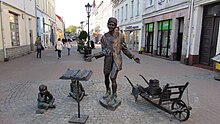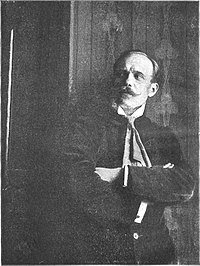Aleksander Majkowski
Aleksander Majkowski ( Kashubian : Aleksander Majkòwsczi , born April 17, 1876 in Berent , † February 10, 1938 in Gdynia ) was a Kashubian and Polish author .
Majkowski graduated from high school in Konitz in 1895 . Two years later he began studying medicine in Berlin . Majkowski spent three years in Berlin, during which he probably made the acquaintance of Stanisław Przybyszewski (no evidence is available). Majkowski continued his studies in Greifswald , from where he was expelled in 1901 for Polish patriotic activity. He moved to Munich , where he finished his studies in 1903. In 1904 he defended his doctoral thesis here . Majkowski began writing in Kashubian while he was still a student in Berlin. When he got to the practical part of his training as an assistant in the Gdańsk St. Mary's Hospital (pl. Szpital Najświętszej Marii Panny ) in 1905 , he also began editing the Drużba supplement in Gazeta Gdańska , which was published in Kashubian.
In 1905 he returned to his birthplace Kościerzyna, where he became a practicing doctor. He published the Kashubian Gryf (Greif) and founded the Public Library Society ( Towarzystwo Czytelni Ludowych ) in 1909 . During this phase, the Young Kashubian Movement ( Towarzystwo Młodokaszubów ), a political association that wanted to preserve and promote Kashubianism, came into being with Majkowski's significant contribution .

In 1911 he moved to Sopot , where he worked as a doctor until the outbreak of the First World War . During the war he had to serve in the German army as a military doctor in various parts of Europe. After the war he returned to Sopot in 1918, where from 1919 he edited the Dziennik Gdański . In 1921 he married and moved to Kartuzy . 1921 to 1923 and then again in 1925 he was editor of the Pomorzanin and the Gryf . During this time he began work on his main work, the Żëcé i przigodë Remusa ( Eng . The adventurous life of Remus ), which appeared in fragments during his lifetime in the magazines Pomorzanin and Gryf . It was only after Majkowski's death in 1938 that a complete edition of this Kashubian epic was published .
Works (selection)
- Jak w Koscérznie koscelnégo obrelë, abo pięc kawalerów a jednô jedynô brutka. W osem spiewach , Danzig 1899.
- Żëcé i przigodë Remusa , Danzig 1939 (1995); (German The adventurous life of Remus: a Kashubian mirror , Cologne 1988, ISBN 3412052884 )
- Pamiętnik z wojny europejskiej roku 1914 (Tadeusz Linkner), Wejherowo: Muzeum Piśmiennictwa i Muzyki Kaszubsko-Pomorskiej w Wejherowie; Pelplin: Wydawn. Diecezji Pelplińskiej "Bernardinum", 2000
- Historia Kaszubów , Gdynia 1938 (1991) (pl.)
literature
- Hans-Jürgen Bömelburg : Cross-border Kashubian biographies with narrow contemporary resonance: Gulgowski, Lorentz and Majkowski. National and intercultural causes . In: Tobias Weger (Ed.): Cross-border biographies between Eastern and Central Europe (= Oldenburg contributions to the culture and history of Eastern Europe ). tape 11 . Internationaler Verlag der Wissenschaften, 2009, ISBN 978-3-631-58554-2 , ISSN 1436-7017 , p. 255–283 ( limited preview in Google Book search).
Web links
- Literature by and about Aleksander Majkowski in the catalog of the German National Library
| personal data | |
|---|---|
| SURNAME | Majkowski, Aleksander |
| BRIEF DESCRIPTION | Kashubian and Polish author |
| DATE OF BIRTH | April 17, 1876 |
| PLACE OF BIRTH | Berent |
| DATE OF DEATH | February 10, 1938 |
| Place of death | Gdynia |

